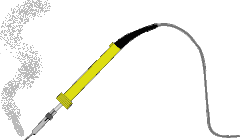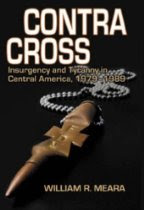Podcasting since 2005! Listen to Latest SolderSmoke
Friday, May 6, 2011
WSPR -- THE MOVIE!
VK2TPM made some nice videos of the Weak Signal Propagation Reporting System (WSPR) maps over time. Its kind of fun to watch the propagation shift from trans-Atlantic to trans-Pacific.
More: http://www.youtube.com/user/vk2tpm#p/u/4/U1sBGZzNv8s
Thursday, May 5, 2011
T/R Success with WSPR
I'm really pleased to have the computer interface working. It is kind of neat to bring together the complex technology of the computer and the simple technology of a DSB/Direct Conversion rig.
Wednesday, May 4, 2011
Five Planets Visible in the Morning
 The good folks over at spaceweather.com have once again alerted us to an important astronomical event: During May, early risers will be treated to a conjunction of Mars, Jupiter, Venus, and Mercury. (The fifth visible planet would be the one you are standing on!) The Moon is thrown in as a bonus. The photo above was taken by Liz Gleeson on Magnetic Island (Australia) -- what a great location!
The good folks over at spaceweather.com have once again alerted us to an important astronomical event: During May, early risers will be treated to a conjunction of Mars, Jupiter, Venus, and Mercury. (The fifth visible planet would be the one you are standing on!) The Moon is thrown in as a bonus. The photo above was taken by Liz Gleeson on Magnetic Island (Australia) -- what a great location!
Labels:
astronomy
Monday, May 2, 2011
More T/Rouble
I get the RTS signal when using a Windows PC, but when I try to switch over to a Linux computer, I don't get the T/R signal from pin 7. Is there some code or setting in Linux that I need to change to make this happen?
Labels:
WSPR
Saturday, April 30, 2011
Working on T/R circuit for HB WSPR rig --need help!
I'm finally working on the PTT T/R circuit for my homebrew DSB /Direct conversion 30 meter transceiver. I hope to use the simple one transistor circuit from W3PM's FB HB WSPR rig.
But I need info on the PTT signal that will come from the computer serial port. Which pins on the 9 pin serial port connector? What kind of signal comes out? Is it 5 volts on transmit? What settings should I use in WSPR? RTS? Any other setting changes needed?
I hope to be transmitting AND receiving soon.
But I need info on the PTT signal that will come from the computer serial port. Which pins on the 9 pin serial port connector? What kind of signal comes out? Is it 5 volts on transmit? What settings should I use in WSPR? RTS? Any other setting changes needed?
I hope to be transmitting AND receiving soon.
Labels:
WSPR
Friday, April 29, 2011
AMSAT OSCAR 7 -- No Batteries, Running Directly From Solar Panels
 From the AMSAT site:
From the AMSAT site:AMSAT-OSCAR 7 was launched November 15, 1974 by a Delta 2310 launcher from Vandenberg Air Force Base, Lompoc, California. AO-7 was launched piggyback with ITOS-G (NOAA 4) and the Spanish INTASAT. Built by a multi-national (German, Canadian, United States, and Australian) team of radio amateurs under the direction of AMSAT-NA. It carried Mode A (145.850-950 MHz uplink and 29.400-500 MHz downlink) and Mode B (432.180-120 MHz uplink and 145.920-980 MHz downlink (inverted)) linear transponders and 29.500 and 145.700 MHz beacons. The 2304.1 MHz was never turned on because of international treaty constraints.
In mid 1981 AO-7 ceased operation due to battery failures. It was thought at that time that the batteries had shorted. However on June 21, 2002, at least one of the shorted batteries went open-circuit, allowing the satellite to waken whenever it is in sunlight, and randomly begin operation in one of 4 modes.
According to the log at planetemily.com/ao7/ao7log.php, this old warrior is still supporting transponder action in mode A and mode B as recently as 9/10/09, and on a regular basis, whenever it is in sunlight.
When the satellite is in sunlight for extended periods of time, the 24-hour timer still switches the bird between modes A and B. Listen for the corresponding beacon to determine which mode the satellite is currently operating in, or refer to the above mentioned web page to see what mode has recently supported QSO\'s as the best estimate of what is the current mode of operation.
Please remember, there are no (functional) batteries, so the satellite\'s power input is limited to whatever output can be generated by the ancient solar panels. Use the least uplink power possible to minimize your downlink power usage, and maximize the number of simultaneous QSO\'s supported in the passband. There are other operating tips at:http://www.planetemily.com/ao7/usage.php
Linear transponder birds are a scarce commodity these days, so please use AO-7 responsibly, but please DO enjoy her!
Labels:
satellites,
Solar power
Wednesday, April 27, 2011
50th Birthday of the Silicon Integrated Circuit
Robert Noyce got his IC patent on April 25, 1961.
Of course, wave soldering would be something to come out of California.
Labels:
radio history
Tuesday, April 26, 2011
Free Kindle Reader for your PC
 This link will take you to the download site. The software will allow you to use your PC as a Kindle reader.
This link will take you to the download site. The software will allow you to use your PC as a Kindle reader. http://www.amazon.com/gp/feature.html/ref=kcp_pc_mkt_lnd?docId=1000426311
Then be sure to get a copy of SolderSmoke -- The Book
http://www.amazon.com/dp/B004V9FIVW
Labels:
book
Sunday, April 24, 2011
SolderSMOKE APRS symbol
 I've been setting up my satellite APRS station. This weekend I finally got the UI-view software running. I had to pick an icon -- this would be the symbol that would show up on the mapping software. In the Azores I had a nice little island with a palm tree. Here in Virginia, well, as I scrolled through the options, suddenly I saw something that seemed appropriate. The coordinates are a bit off, but that, my friends, is a smoke stack emitting 60/40 fumes.
I've been setting up my satellite APRS station. This weekend I finally got the UI-view software running. I had to pick an icon -- this would be the symbol that would show up on the mapping software. In the Azores I had a nice little island with a palm tree. Here in Virginia, well, as I scrolled through the options, suddenly I saw something that seemed appropriate. The coordinates are a bit off, but that, my friends, is a smoke stack emitting 60/40 fumes.
Labels:
satellites
How to Join G-QRP (and get SPRAT) in the USA

From the G-QRP web site:
Formed in 1974, the GQRP Club is a non profit organisation run entirely by volunteers to promote Low Power Radio. Whether you have a ham licence or not - everyone is welcome. Our quarterly magazine SPRAT provides a fascinating read containing articles of varying complexity, from simple test equipment, to fully functioning radio transmitters and receivers. Membership fees are about as low as you will find anywhere and our club sales service to members is second to none.
Indeed. Joining G-QRP and getting SPRAT is something all QRPers and homebrewers should do!
Some SolderSmoke listeners have asked me how they can join G-QRP from the U.S. Bill Kelsey is the club's man in America:
Bill Kelsey - N8ET 3521 Spring Lake Dr., Findlay, OH 45840 U.S.A.
$18 paid in USA.
Bill's e-mail and more info here: http://www.gqrp.com/memb_usa.htm
OR... You can pay directly via PAYPAL:
http://www.gqrp.com/paypaldx.htm
Saturday, April 23, 2011
Messages (for me!) from space station
 When I started receiving packets via the International Space Station earlier this month, I noticed a familiar call: KB1GVR. He was one of the few North American stations who could pick up my packet beacons via PCSAT -- he would then relay them to the internet. This month, when I sent my sigs through the ISS, OM GVR spotted them, and sent reply messages to me via the packet system. I didn't get them via the satellite -- they came to me via the "Stations Heard Via ISS" web site. But still, it was fun to run into an old friend via the space station.
When I started receiving packets via the International Space Station earlier this month, I noticed a familiar call: KB1GVR. He was one of the few North American stations who could pick up my packet beacons via PCSAT -- he would then relay them to the internet. This month, when I sent my sigs through the ISS, OM GVR spotted them, and sent reply messages to me via the packet system. I didn't get them via the satellite -- they came to me via the "Stations Heard Via ISS" web site. But still, it was fun to run into an old friend via the space station.
Labels:
satellites
Friday, April 22, 2011
The Novice License: Two Years on PROBATION!
 Somehow I remembered it as being one year, non-renewable, but Neil, WA4CHQ, wrote to tell me that he remembered a two year term. I think Neil is right. The excellent web page of the Novice Historical Society provides the details and many really nice stories from our days as novices. http://www.novicehistory.org/
Somehow I remembered it as being one year, non-renewable, but Neil, WA4CHQ, wrote to tell me that he remembered a two year term. I think Neil is right. The excellent web page of the Novice Historical Society provides the details and many really nice stories from our days as novices. http://www.novicehistory.org/
Labels:
radio history
Subscribe to:
Posts (Atom)




























